General Christianity
-
Entering a process of discernment that includes debate, remembering core doctrine, and careful listening
-
Judgment made and articulated in light of Gospel experience and Scriptures by an authorized and trusted representative of the church.
-
Compromise for the sake of relational and public unity.
-
Clear communication not only in a published statement, but via relational face-to-face interactions
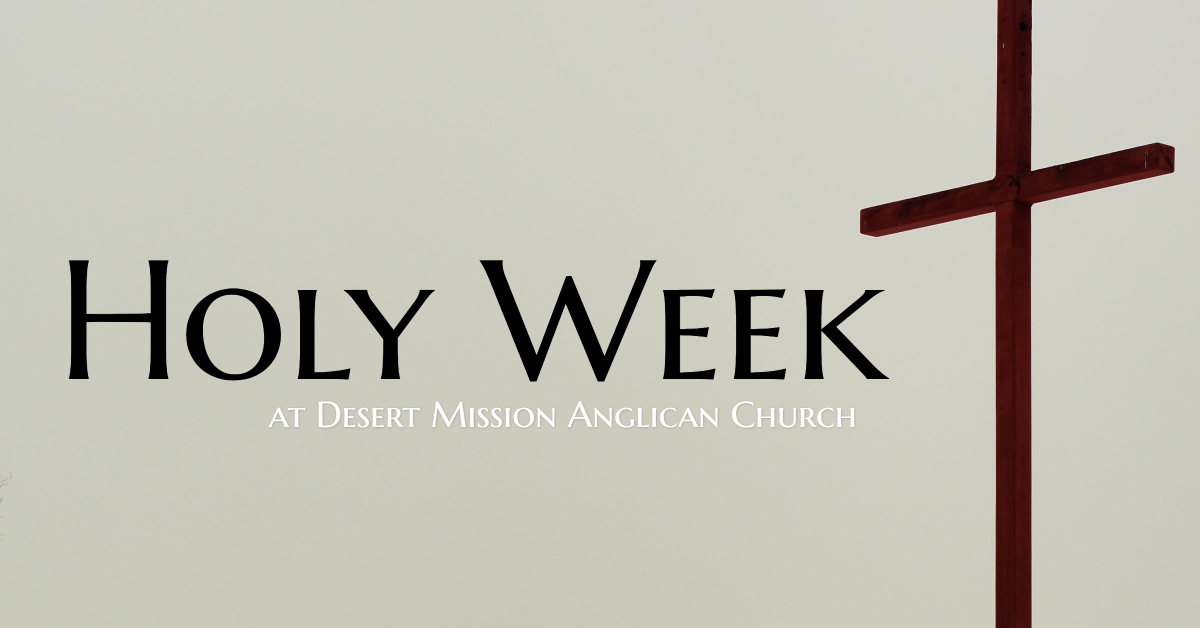
For anyone in the Phoenix area: you are warmly welcomed to join me and the rest of my church for worship this week. 🗺️ Location
⁜ Holy Week 2024 ⁜
🥖 Maundy Thursday
6:30pm – Holy Communion with Tennebrae
Arrive at least 20 minutes before service to make use of space and clean towels ready for footwashing prior to service
Come with a friend or family to wash each other’s feet, or allow member of the clergy to serve you.
“If I then, your Lord and Teacher, have washed your feet, you also ought to wash one another’s feet.” - Jesus (John 13:14, ESV)
✝️ Good Friday
8:30am - 3:30pm – Open Chapel for Silent Prayer
6:00pm – Stations of the Cross
Interactive, devotional service with Communion from the Reserve to meditate on our Lord’s walk to the Cross
🕯️ Easter Vigil
6:00 pm – Service of Light & Lessons
The Easter Celebration begins!! Lighting of the New Fire, Procession with the Paschal Candle, Readings proclaiming the mighty acts of God, & Classic hymns.
☀️ Easter Sunday
9:30am – Holy Eucharist
Join us for a special service of joy as our Easter celebration culminates in Holy Communion.
Recently gave this podcast interview - Grateful for the opportunity to share about how God is working in the small things to bless Sunnyslope through Desert Mission Anglican Church, and DMAC through Sunnyslope. We love our neighborhood and see so much beauty there!
“…fret not yourself, lest you be moved to do evil.”
FAITH IN THE AGE OF AI IS NOT ONLY POSSIBLE…IT IS ESSENTIAL
A review of Faith in Age of Artificial Intelligence: Christianity Through the Looking Glass by Dan Scott
There is no question for me, as an Elder Millennial that witnessed the advent of the Internet, the introduction of the smartphone, and the rise & fall of social media, that a new era is upon us. We are, of course, only scratching the surface of the implication of newly unveiled “artificial intelligence” technologies.
Much of the handwringing does seem, at this point, to be a bit overblown. Still, no one can doubt the real economic and creative implications of machines that—dumb as they may be in reality—can convince, or very nearly convince, most people that they are humans.
No sphere of life or industry will be left untouched by AI, and as it gets better, ethical lines will become blurry, and our grasp on what we think is real will seem a bit slippery. Circumstances will emerge that would have seemed the stuff of far-out science-fiction only a decade ago. But here we are.
A much needed book
Dan’s Scott’s book, Faith in the Age of Artificial Intelligence: Christianity Through the Looking Glass comes at the perfect time. We’re asking questions we didn’t know could be asked mere months ago.
From a Christian perspective, we are quickly finding that yesterday’s assumptions and answers will not do—but then, Scott helps us realize those answers were kind of new, anyways.
Contemporary Christianity has in many of its broadest circles lost touch with the kind of deep philosophical and theological reflect that characterized the early Christians. So, Scott wants to ground us the thinking of this ancient Christian community, a community that thought deeply, on similar (though not identical questions) of creation, consciousness, evil, incarnation, and the nature of divinity.
This, he does masterfully, synthesizing for the regular guy like me an immense amount of essential (and difficult) reading into 23 accessible chapters.
Faith in the Age of AI isn’t really a book about the specifics of artificial intelligence, per se. Instead, it’s a sort of guidebook to navigating the kind of world in which AI exists. Scott uses this emerging technology and the questions it raises to as a launch pad to explore the most important ideas we need to know, demonstrating along the way the viability of a Christianity grounded in ancient thought as a path into the future.
Ancient-future Christianity for the digital age
In the opening pages, Scott reminds us that “Christianity is…more than a community of people sharing spiritual experiences or affirming certain ethical and moral principles. Christianity is (or is intended to be) a philosophical school that trains us how to relate to and respond to reality.”
We are then presented with crash-courses in consciousness, theology proper, meaning, information-theory, the historical claims of Christianity, the nature of humanity and meaning, and more, all in conversation with Christian voices of the first five centuries.
The level of accessibility of all of this is impressive, but it never feels dumbed down. That said, plan on spending some time with this book. The ideas, while presented in a very understandable way, are big enough to cause one to pause for minutes, hours, or even days between chapters, pages, and paragraphs.
Deconstruction isn’t the end
I think this book could be a special help to those of us that have gone through the much lambasted and lamented “deconstruction” process. We find much here to help us “reconstruct” something different. This something will be different, no doubt, than what was always destined to be crushed by reality.
Dan Scott is providing a blueprint and materials to build back a faith that is strong, flexible, beautiful, and true.
This book isn’t just relevant. It’s needed.
Scott rightly observes, “Serious people often have serious questions.” Thankfully, he’s offering honest answers that leave room—and even encourages—further exploration rather than closing the door on humble inquiry.
If you care about how to move, grow, and flourish in the increasingly unfamiliar territory represented by the recent emergence of AI, and especially if you are curious as to how Christianity might speak into this, then this book is for you!
→ Get it on Amazon
One of my core “mentors from afar,” Tim Keller, has died. It feels like such a tremendous loss. Although I did not know him personally, he had a tremendous personal impact on me.
Tim Keller’s preaching and teaching and pastoral posture have helped me profoundly, and formed me deeply. So many times, his writing and preaching steadied my faith and brought me deeper into the beauty of the biblical story.
I give thanks to God for what I know of his life and ministry. Praying for that special peace that comes from the Spirit to comfort him and all his loved ones.
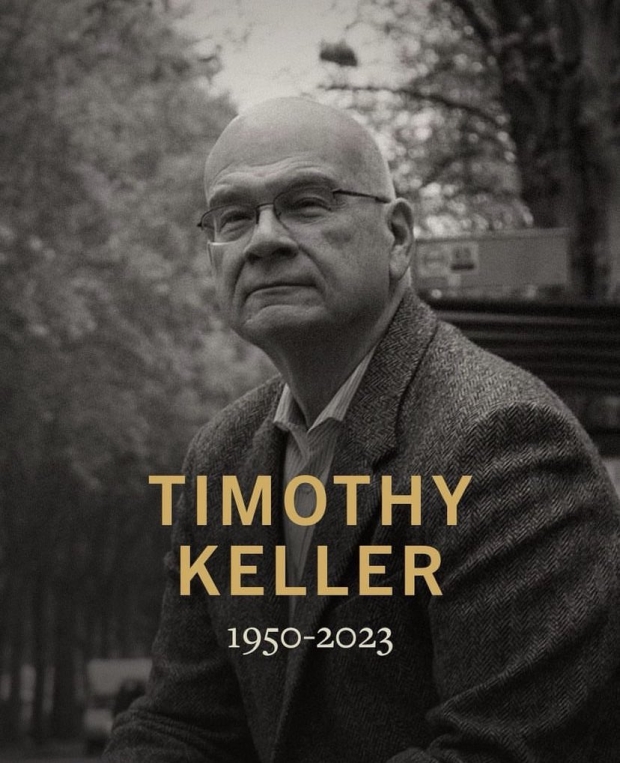
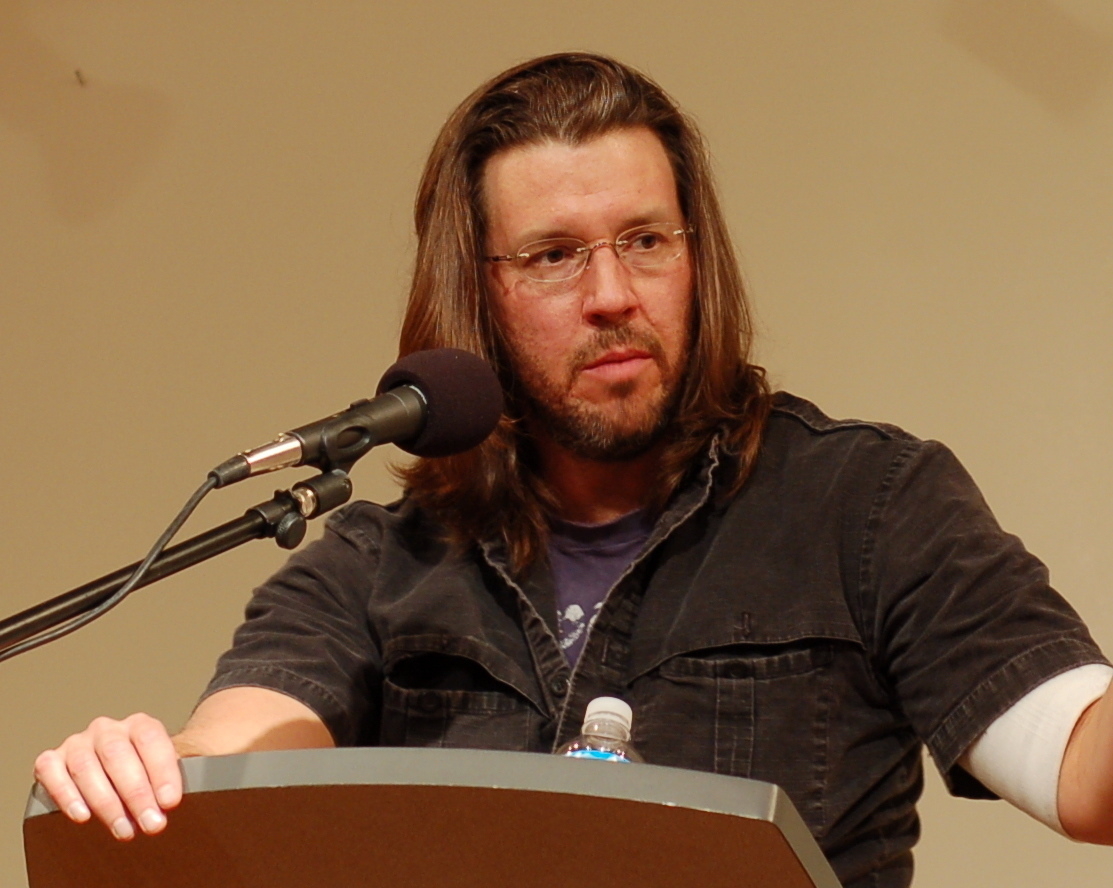
Been reading a bit about David Foster Wallace today. In my circles, quotes from his famous Kenyon College commencement address, “This is Water,” are often deployed. Was glad and saddened to learn more.
Photo: Wikipedia
Something beyond comprehension happens to the crucifixion of Jesus when it gets turned into “Good” Friday. That something is the resurrection, which transforms crucifixion from hideous injustice into redemptive event. That transformation does not undo the hideousness or permit us to put paid to the cross. No, resurrection makes the crucifixion all the more unjust and hideous – and redemptive!
Read the whole reflection from Scot McKnight. It’s worth your time.
Yesterday I witnessed my sisters and brothers in Christ:
joyfully welcome newcomers,
pray with compassion for those that are hurting,
labor toward unity in the midst of disagreement,
dream about God’s calling and plans for our church,
be honest about insecurities,
give thanks to God,
show up early and stay late,
pray and praise,
encourage each other,
take members home from the hospital,
give rides to and from church to those that can’t drive,
visit the grieving in the midst of their own grief,
deliver furniture to those in need,
bless children,
–basically, be the hands, feet, presence of Christ. Sundays can be exhausting days for pastors. Yesterday was especially long for me, but looking back on what I witnessed–
I feel so grateful to be able see in so many ways how God is working in and through his people.
Photo by Steward Toliver of one of our parishioners, Jason Hensley, serving as an acolyte as he does most Sundays. Here he is lighting candles, a symbol of the light that Christ shines on us and through us into the world.
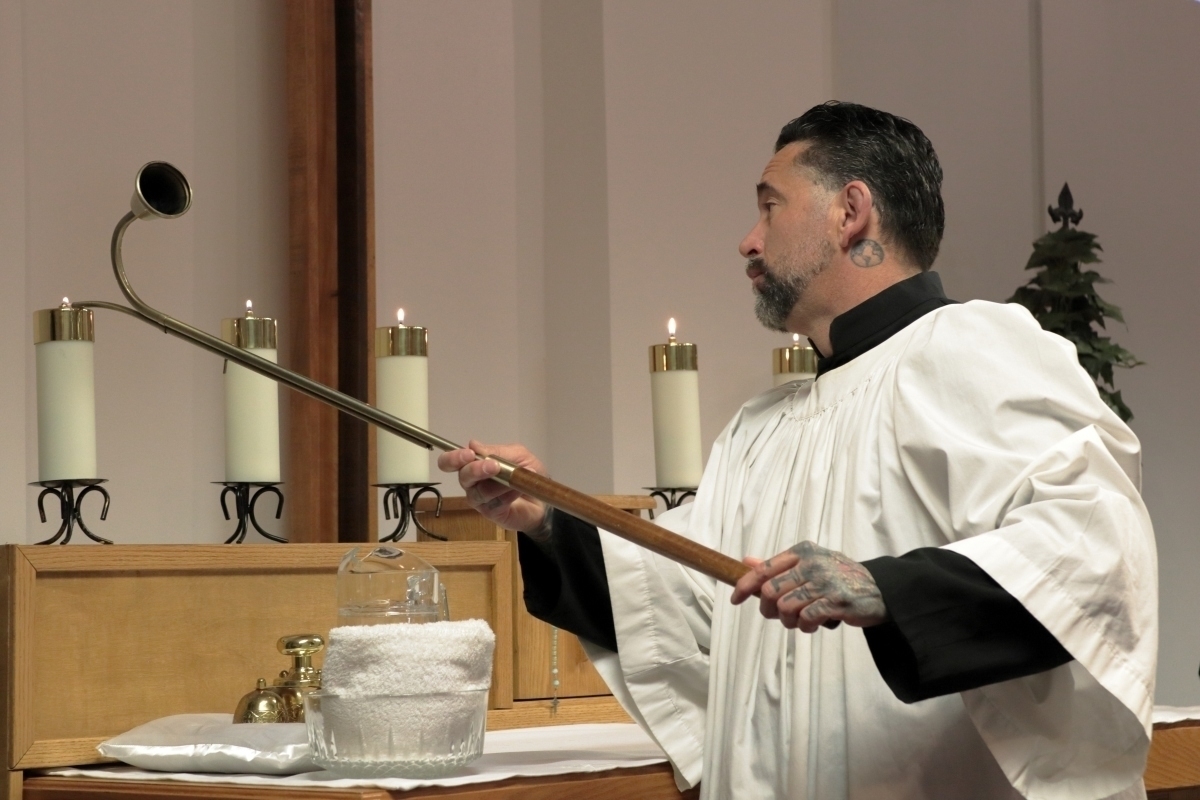
The foolishness of the Cross of Christ
To be honest, many people do misunderstand the cross, and think of it as some kind of divine child abuse, as if the suffering of Christ in itself instead of the compassion of Christ in and through suffering is what pleases God.
Yet even when framed correctly, as the act of self-sacrifice, love, forgiveness, and redemption that it is, it remains “… a stumbling block to Jews and folly to Gentiles,” (1 Corinthians 1:23, ESV)
Why? I think because story of the Cross told simply and faithfully is a story about humanity’s inability to save ourselves, to lift ourselves completely out of our worst tendencies. The story of the Cross says everyone needs to be taught and transformed in order to live. The story of Cross says human beings don’t know how to live apart from God, because it is impossible to live apart from God. The story of Cross says all the wisdom of humanity is nothing compared to one simple and perfect act of divine love.
God’s ways have always been simple: “He has told you, O man, what is good; and what does the LORD require of you but to do justice, and to love kindness, and to walk humbly with your God?” (Micah 6:8, ESV)
We can do a lot as human beings: we can go to space, cure many diseases, discover much of the world and build all kinds of great wonders, but what we can’t seem to do without help is live in harmony with God and each other. The world still seems awfully short on justice, often unwilling to consider kindness, and wondering what humility really is. We cannot overpower the sin that leads to death.
How are we to even know what justice and love and kindness and walking humbly in the ways of God even means?
Quite simply, we can look to Christ, because Christ is the wisdom of God for us. This means not only does he teach the wisdom of God for our benefit, he lives out the wisdom of God for our salvation.
God, come to us as one of us in Christ Jesus, chooses the way of humble forgiveness to be the way of salvation. And his way is vindicated by his Resurrection in the power of the Holy Spirit.
We can hardly grasp that this is the way that God would save the world, yet we now know that perfect love expressed in forgiveness for sinners is the antidote to sin, an antidote only God himself could manifest, that only God himself could administer.
This post is based on a sermon I preached.
Photo by Josh Applegate on Unsplash
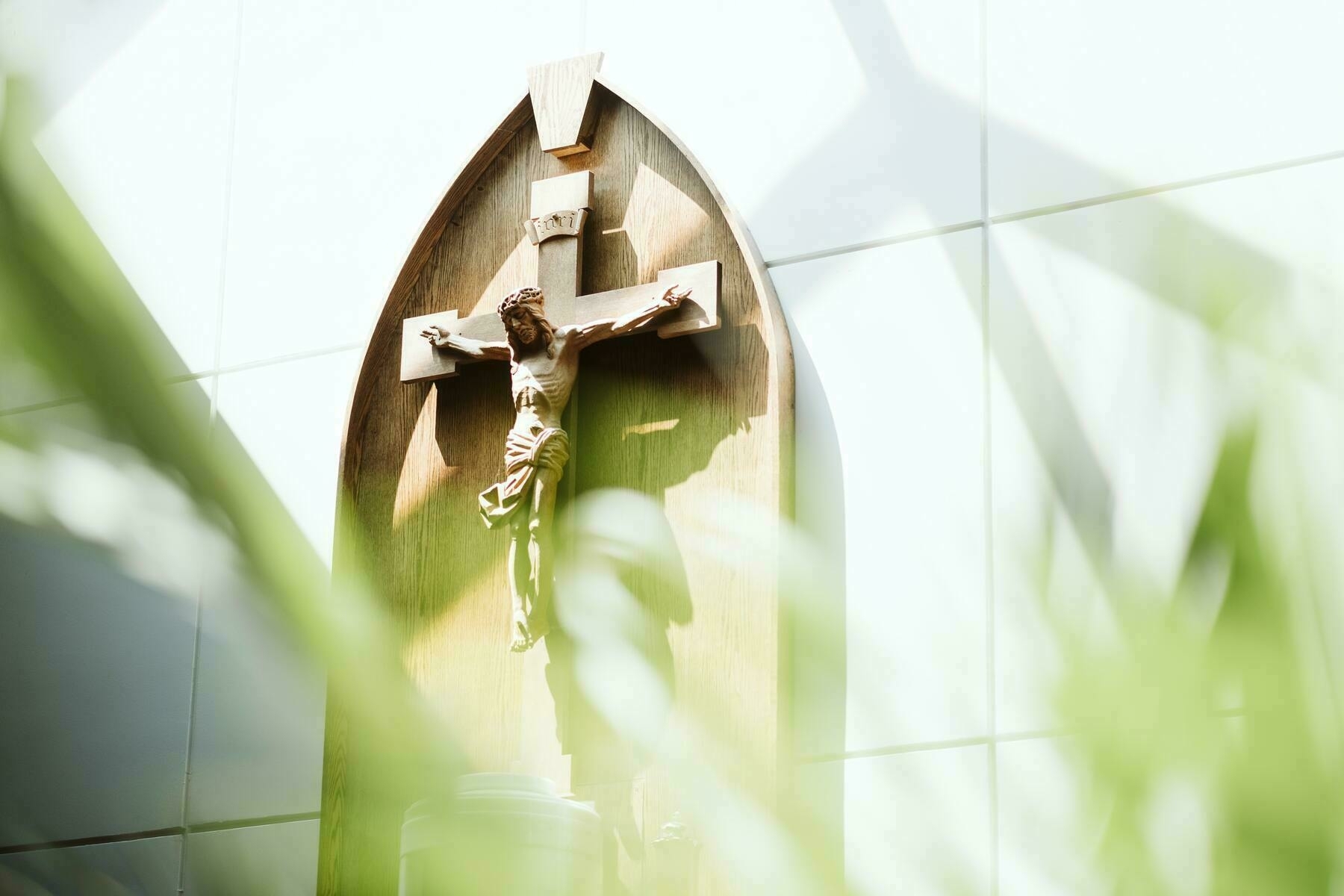
King of Forgiveness
Even the people of God can’t govern themselves in such a way that provides for the flourishing of the community. This is because all people, including the people that God calls to himself, are infected by their own selfish and self-destructive attitudes, actions, and affections.
So even when we try to rule with the best of intentions, the most thoughtful checks and balances, the best statements of human rights, we get all twisted up in our own way. Fear, greed, and pride lead to violence, war, and death. Every time. Every purely human empire falls eventually.
So, God promises steps in to rule directly. He will appoint leaders. He will raise up a human king in the line of the best human king Israel ever had, David. This king won’t fail in all the ways that David did, morally, ethically, politically. This king will finally be faithful to God’s rule…but how?
This King will be God himself come to us, as one of us.
This King is, of course, Christ himself.
This means whatever we think we know about how kingdoms are supposed to operate, supposed to be run, supposed work, takes a back seat as we are illumined by the way of Christ…which is just so very different than the kingdoms of this world.
We could think of many ways that we would establish a kingdom. But we probably wouldn’t think of allowing our enemies, foreign and domestic, crucify us under false pretenses and forgiving them anyways.
But this is what Jesus did.
Jesus' Kingdom is founded on forgiveness, ruled from the Cross, and advanced in the way of the Cross.
As naive and idealistic as that might sound, it’s how God does things. And his is the only Kingdom that will be left standing in the end.
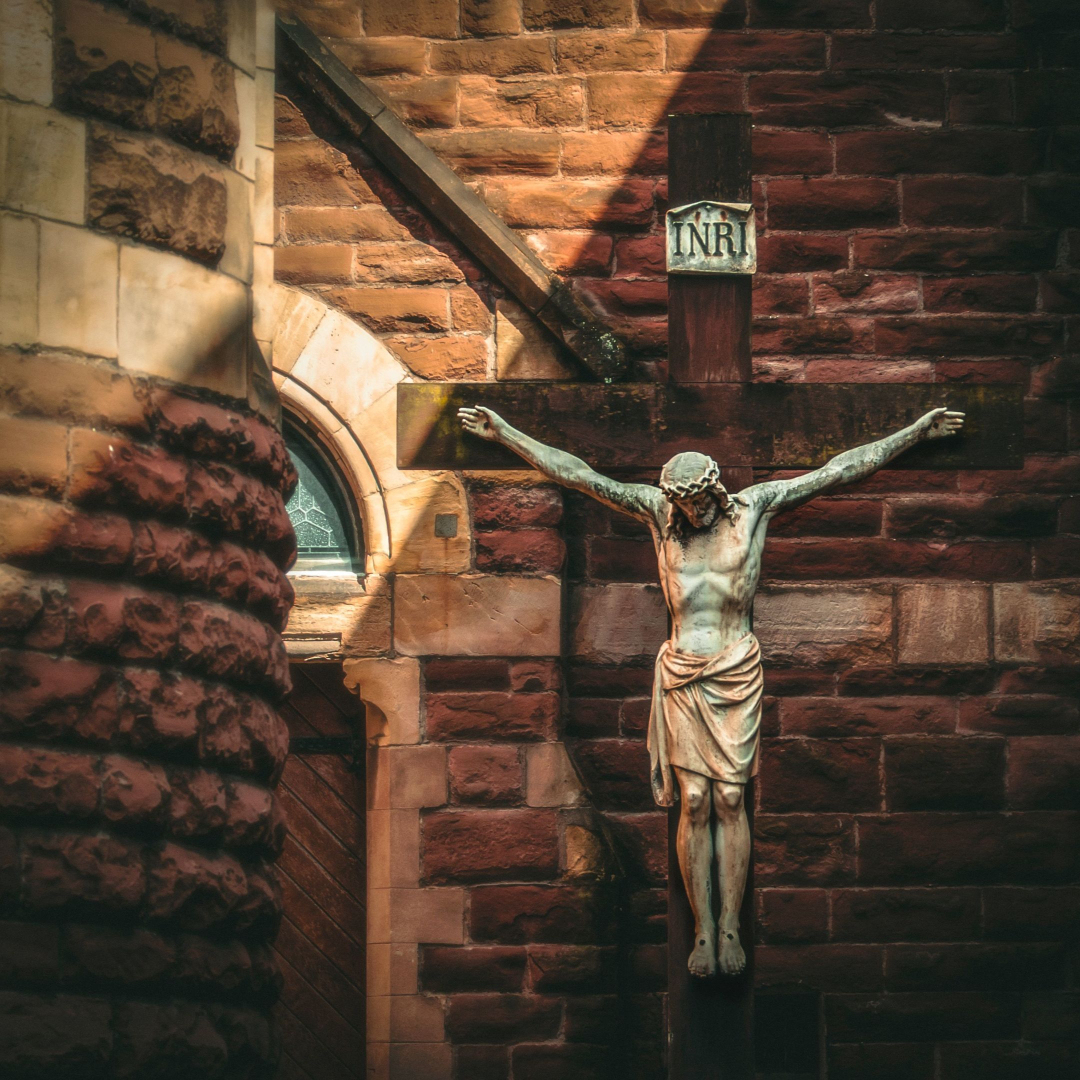
Without just works, our worship can't be true
Both right worship and good works are vital, but without just works accompanying it, our worship cannot be true.
Listen to what the Lord said through Isaiah:
““What to me is the multitude of your sacrifices? says the LORD; I have had enough… Bring no more vain offerings; incense is an abomination to me. New moon and Sabbath and the calling of convocations— I cannot endure iniquity and solemn assembly. Your new moons and your appointed feasts my soul hates; they have become a burden to me; I am weary of bearing them.” (Isaiah 1:11–14, ESV)
The problem wasn’t with the offerings themselves, it was that they were vain offerings. That is, they meant nothing to the people offering them because there was no genuine repentance or turning away from evil. The problem here is the hypocrisy of blatant iniquity, and the attempt to cover it over with solemn assemblies.
So, God says,
“When you spread out your hands, I will hide my eyes from you; even though you make many prayers, I will not listen; your hands are full of blood.” (Isaiah 1:15, ESV)
We can’t cover our selfish, self-destructive attitudes, actions, and affections with ritual, ceremony, or even creeds. Saying the right things, and knowing the right things are not the same thing as truly believing the word of God. Truly believing the word of God is always worked out into actions that reflect the character of God as good, compassionate, just, and merciful.
This is the first thing that God desires to please him. Right worship and ceremony can support and reflect a life lived in imitation of God, but to quench the Spirit’s leading toward this in the liturgy is nothing less than a rebellion against the living God.
Sisters and brothers, we will not win that fight.
“…the Lord Jesus…[will be] revealed from heaven with his mighty angels in flaming fire, inflicting vengeance on those who do not know God and on those who do not obey the gospel of our Lord Jesus. They will suffer the punishment of eternal destruction, away from the presence of the Lord and from the glory of his might,” (2 Thessalonians 1:7–9, ESV)
Evil will be cast out of existence, and if we keep holding on to evil, we will also experience the punishment of that purifying fire.
On our own, we have an inevitable tendency to hold on to evil. To return again to our sinful, selfish, self-destructive ways. Yet God in his mercy sent his Son to forgive us of our sins, to heal us from its effects, to set us free to orient our lives toward justice and life. ““Come now, let us reason together, says the LORD: though your sins are like scarlet, they shall be as white as snow; though they are red like crimson, they shall become like wool.” (Isaiah 1:18, ESV)
This is confirmed in a Gospel passage from Luke 19. This is the wonderful story of Zacchaeus the cheating tax collector who, upon encountering Jesus, does a complete 180. He turns from his sin and makes everything right, going above and beyond as he restored all he owed to those he cheated.
“…Jesus said to him, “Today salvation has come to this house, since he also is a son of Abraham. For the Son of Man came to seek and to save the lost.”” (Luke 19:9–10, ESV)
Notice the salvation here isn’t being swept out of this world, but rather things being as they should be in this world.
This is what is possible in the present as we trust that Jesus’ is indeed the pattern for all humanity. This what we are saved into when we receive the forgiveness of our own sins that Jesus offered on the cross, even has as he was unjustly murdered. This is how we are freed to live as we receive the same Holy Spirit that raised Jesus from dead.
It’s this experience of forgiveness and real change of heart and life that confirms the promised hope that this work of the renewal of all things has only just begun, and will indeed be completed when Jesus comes again.
It is the grace of God in Christ that makes it possible for us to “cease to do evil, learn to do good; seek justice, correct oppression; bring justice to the fatherless, [and] plead the widow’s cause.” (Isaiah 1:16–17, ESV).
4 parts of making peace with discernment
I think the church today would do well to emulate these practices that are evident from the Jerusalem Council in Acts 15:
Ordained a priest 7 years ago today. So grateful to God and to those that he has called me to serve. I’m especially thankful for my wife, Amber, who is a constant support, source of wisdom, and inspiration to me as she serves faithfully in her own ministries.
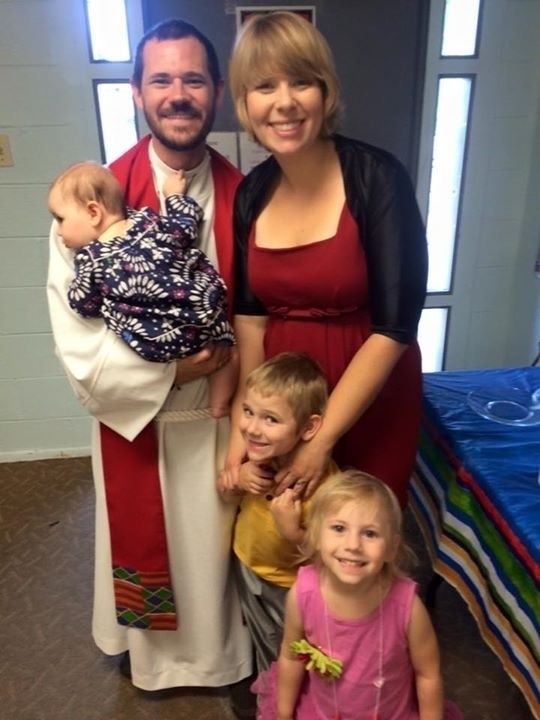
Practice what you pray
Prayer is what grounded and energized Jesus' life of action for the sake of the world.
Jesus practiced what he preached and what he prayed.
He was faithful in prayer; we read about it throughout the Gospels.
He also took action as he healed the sick, threw out the dishonest money changers from the temple, restored dignity to prostitutes, elevated the value of children, and even stood against the death penalty for an adulterous woman.
Almost every time, someone was there to critique Jesus harshly, even as he was modeling and working true justice in the world. But St. Peter says,
“When he was reviled, he did not revile in return; when he suffered, he did not threaten, but continued entrusting himself to him who judges justly.” (1 Peter 2:23, ESV)
When we follow the story of Jesus closely, we realize the world has no shortage of unjust judges. We realize so often we are the unjust judges, trying to justify our own selfish and destructive attitudes, actions, and affections, regardless what that means for ourselves or those around us.
Jesus entrusted himself to Justice, to God, as he submitted even to the unjust judgement of sinful and selfish human beings, giving his very life on a Roman cross.
Yet as we were wrongly proclaiming him guilty, he was freely forgiving every sin. As we were condemning him to death, he was taking death itself with him to the grave.
His love was so great, that it endured the greatest injustice imaginable, and began to bend the universe back into the shape it should be. He rose from the dead in vindication that love and forgiveness and mercy triumph over judgement.
In this, he accomplished true justice. Not in the sense that everyone gets what they deserve—if that was the case no one could be saved, because we all truly deserve to be judged and condemned by our sins.
But Jesus accomplishes justice in the sense that he is setting things right in the world, robbing death of its power, and replacing it with the certain hope of renewal of all things as sheer gift of undeserved grace from God.
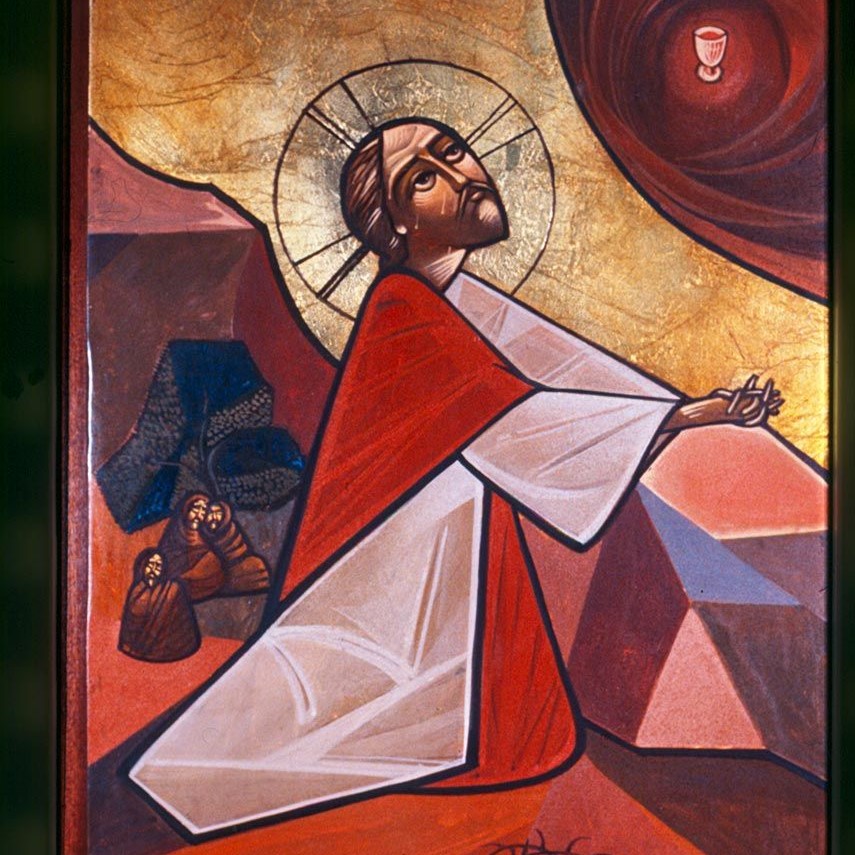
The Word of God is not bound
St. Paul, in his first letter to Timothy in the first chapter and second part of verse nine writes:
The word of God is not bound.
How does God speak his good word to us? In the Bible, the author of the book of Hebrews says,
“Long ago, at many times and in many ways, God spoke to our fathers by the prophets, but in these last days he has spoken to us by his Son, whom he appointed the heir of all things, through whom also he created the world. He is the radiance of the glory of God and the exact imprint of his nature, and he upholds the universe by the word of his power… (Hebrews 1:1–3, ESV)
You see, in the ultimate and most important sense, Jesus is the word of God that cannot be bound. All the Scriptures are words of God that refer to the Word that is God come to us as one of us. The Gospel writer John said,
“In the beginning was the Word, and the Word was with God, and the Word was God. He was in the beginning with God. All things were made through him, and without him was not any thing made that was made. In him was life, and the life was the light of men. The light shines in the darkness, and the darkness has not overcome it.” (John 1:1–5, ESV)
You see, Jesus is the very word of God, the personal creational power and pattern of all existence, made incarnate, enfleshed, inseparably uniting complete divinity with full humanity forever.
So, Jesus forgives our sins. Jesus heals our wounds. Jesus draws people into a new community. Jesus lived as every human is meant to live, even when that meant he would die because we would reject him. So we nailed him to a cross and lifted him from the earth to show the world, it would be our way, the way of death, that would reign.
But Jesus would not and could not be bound by our sin. Jesus would not and could not be bound by even death, so he broke the bonds of death, trampling Hell and Satan under his feet. The word of God is not bound!
Yet, Jesus binds us to him, so that:
“… if we have died with him, we will also live with him; if we endure, we will also reign with him; if we deny him, he also will deny us; if we are faithless, he remains faithful— for he cannot deny himself.” (2 Timothy 2:11–13, ESV)
Pride & Dignity
We could talk about how every person’s selfish and self-destructive attitudes, actions, and affections disqualify us from deserving anything from God. Pride is a problem because it assumes I deserve something God based on something I have accomplished in myself, and due to sin I can never accomplish the level of goodness that God requires.
This is true, as far as it goes.
But here’s the thing: life with God has never been about human beings deserving something from God because they ever fulfilled some ideal of being quote “good enough.”
How could God, who creates and sustains the universe with a word, ever owe a created thing anything?
The truth is God doesn’t love people because they are owed it. He loves people because that’s just who he is. That’s what he does. He loves.
And this is the life of the universe.
We owe other people the appropriate honor, dignity, and concern not because of they’ve done anything to deserve it, but because regardless of what they’ve done, they are precious in God’s sight. We do deserve to be humbled sometimes because we forget that if we are lovely, it’s only because we are finally coming around to living the light of the truth that God loves us, just because he made us.
If we are in trouble as human beings, it because we reject and refuse that love in a thousand sinful, selfish, and destructive ways. We think we can live on our own apart from God’s love.
Humans have done this since the Garden of Eden!
We’ve all participated in the rejection of God’s love at some level, and this is the fundamental human problem. In this way we can see how pride is very much at the root of many sins, if not all sin. We all need to be accepted, to be loved, to be in fellowship; that’s the root desire that gets twisted into pride.
When by the grace of God we embrace humility as the Way of Christ, we realize we already have what we desire in him.
It’s been there the whole time.
Jesus invites all through the waters of baptism to his table, to his feast, to his banquet, to find true spiritual nourishment in the true bread and true drink of his own cleansing body and blood offered for the sins of the world.
We can come humbly to Christ, confessing and receiving him as Lord of our lives, instead of ourselves and find we are lifted up together as participants is Christ’s resurrection, received as friends of God, adopted as brothers and sisters of Jesus, and made co-heirs with Christ in his eternal Kingdom.
On the Narrow Door
Someone comes to Jesus and asks,
“Lord, will those who are saved be few?” (Luke 13:23, ESV)
Jesus doesn’t answer the question, though, at least not directly. He says, ““Strive to enter through the narrow door” (Luke 13:24a, ESV)
What a side step! I think we immediately see two things in this first part of his response: First, the question was the wrong one. If it was the right one, I think Jesus would have answered it. So we can assume from this Christ doesn’t want us worrying about the number of people that are going to be saved into the Kingdom. Even though it wasn’t asked, Jesus cares enough to answer the right question, though, which is will I be saved?
Now, in the immediate context here, the salvation in view is probably specifically referring to the looming judgement that Israel will bring on themselves if they reject Jesus as Messiah and his way of life as essential.
Nevertheless, we would be foolish to think this warning doesn’t apply to every generation and every person!
Jesus wants us be thinking about our selves, our attention, our efforts to enter the Kingdom now, for the sake of eternity.
Now, salvation is always God work in us from beginning to end, but this doesn’t mean he turns us into robots. The same St. Paul that talks about grace through faith in Ephesians also wrote to the Philippians: “… my beloved… work out your own salvation with fear and trembling, for it is God who works in you, both to will and to work for his good pleasure.” (Philippians 2:12–13, ESV)
Remember, grace is opposed to earning, not effort. It’s been said we don’t work for grace, we strive from grace. The availability of salvation, and the power to persevere in it are always given to us, no strings attached. But Jesus will never force us to follow him. Those that want to follow Jesus have to make that decision, and actually follow. This takes real mental and physical effort. This is what Jesus is talking about when he says we are to strive to enter the Kingdom.
But what about the narrow door? Jesus talks about earthly treasure that can’t follow us into heaven in Luke 12. In Hebrews 12, the author encourages the church to lay aside the weight of sin. The door is narrow because there are things that we just can’t bring with us into the Kingdom. We’re going to have to let some things go in order to fit. We certainly can’t bring the physical stuff we accumulate for ourselves. We can’t bring our selfish and self-destructive attitudes, actions, and affections. We can’t bring anything, in other words, that does not look like Christ.
I believe the door is as narrow as the Cross where Jesus died.
It was there, at the cross, that Christ was glorified, that his rule of love was made manifest, and where path from death to life was made straight for us. Jesus, in his perfect humanity and divinity, was able to make a way for all of us still caught up in all forms of evil and death. He went ahead of all humanity, blazing a trail with the light of his love, his forgiveness, and his victory over sin. He did something that would be impossible for any of us on our own: he came out the other side of the death—Resurrected, never to die again. Not only does he continue to shine that light for us to see the way, but he sends his Spirit of grace to empower us with his very life, so that we too can follow him through the narrow way of the cross, endure death and share in the Resurrection.
So we can and must strive by grace and in faith for the Cross of Christ, to cling to it, and not just the idea of it.
It is not enough to simply know about Jesus. To enjoy his presence from time to time, on our own terms. We can’t assume that we will enter the Kingdom now or ever, just because we participate in Holy Eucharist sometimes and listen to Bible teachers on YouTube, if our efforts do not continue to direct us toward Jesus in our overall way of life.
It is not enough to simply acknowledge in our minds that his way is The Way, without putting for the effort to truly walk in it in the present. The warning here is unavoidable: there will be consequences for not walking through the door while it is open, and there will be a time where some will want to walk through it, but will have simply waited to long. There are some people that will respond to Christ at the last minute, and truly follow him—while others will have been around Jesus for awhile, and never take a real step toward him.
“And people will come from east and west, and from north and south, and recline at table in the kingdom of God. And behold, some are last who will be first, and some are first who will be last.”” (Luke 13:29–30, ESV)
Those that come immediately into the Kingdom, even if they are last to hear about it, will nevertheless find the Bread of Heaven which will keep them to eternal life. Those that delay in following Christ, even if they’ve known of him for a long while, will live to regret it.
To enter the narrow door to the Kingdom of God now and forever, we must strive to participate in the cross-shaped life of Christ, today. Not tomorrow, when we wrongly think we’ll be more prepared. The door might be shut then.
But today.

A Faith That Sings
Reflections on Mary’s Song (Luke 1:46–55)
Our Christian faith is a faith that sings.
The people of God have always sung about our God and his goodness to us. We live in a cultural context—and sometimes even a church context—where we are forgetting how to sing.
On a very practical level, singing isn’t something many people get together to do anymore. Maybe, maybe around Christmas. Even in the church I notice some people choosing not to sing and let the worship leader do it for them. Of course, I think this is a sad mistake.
When we sing, something changes in our minds and hearts. And something changes even further when we sing words that are married to the truth of who God is and who we are. Grace can take root in those moments in special ways.
Mary, as she always does when we take her on her own terms, helps us to worship God by pointing us to Jesus. Through her song, the Magnificat, she helps us to understand true worship. Many worship songs have come and gone over the centuries, hers has stood fast—what is it about the Mary’s song that makes it the kind of worship song that will last into eternity?
There’s a lot, but let me draw out just three things for our time together today.
First, it’s a song that places God at the center. This is how it begins: “My soul magnifies the Lord.” My soul makes God bigger to me and to those around me. Notice this is God-centered, but it doesn’t neglect the impact on the individual.
But also notice—and here’s the second thing—that the emphasis, when it comes to the individual, is on humility. “He has looked on the humble estate of his servant.” There is an honest acknowledgment from Mary that she is poor and oppressed. She and her people need God to act, not just in quote “spiritual” ways, but in ways that affect the concrete reality of their existence, in ways that prove that God keeps his promises, even when we human beings do not. This is why his mercy is needed.
This is the third observation: The joy comes as Mary recognizes that the mercy of God has always been for those that fear him, that is, those who understand that God’s purifying love is what must direct their lives in order for them to flourish. And the ultimate expression of God’s purifying love, the kind of love that lifts up the lowly but puts the proud in their place, is being born in Mary’s body.
Jesus, though he never sinned, bears the ultimate consequence of humanity’s selfish and self-destructive attitudes, actions, affections in his body as he dies on a cross. Yet, in his mercy he forgives every sin, even the sin of killing God, and so death begins to come undone and he is raised from death to Resurrection life in the power of the Holy Spirit. That’s the life that he gives freely and without reservation to all that will take it. It’s a life that makes a concrete difference for everyone who receives it—how could anyone stay the same after encountering and receiving in themselves the very life of God?
This is why Mary burst into song.
So, of course, the songs we sing matter. Are they God centered? Are they humble? Do they exalt God’s concrete action in the world in Jesus Christ? These are important questions. But the questions go deeper: Am I in my whole life, singing a song that would resonate with Mary’s? In other words, Am I God centered? Am I honest with myself about my concrete need for God? And am I trusting God to meet those needs for me in his Son, Jesus?
The Good News of the Magnificat is that God is God which means I don’t have to be. You and I can acknowledge our need, and live a life that marked by joyful thanks for God’s provision in Christ.
That’s a song worth singing a thousand different ways—and worth teaching the world to sing too—with our lips, and our lives, and from our hearts.
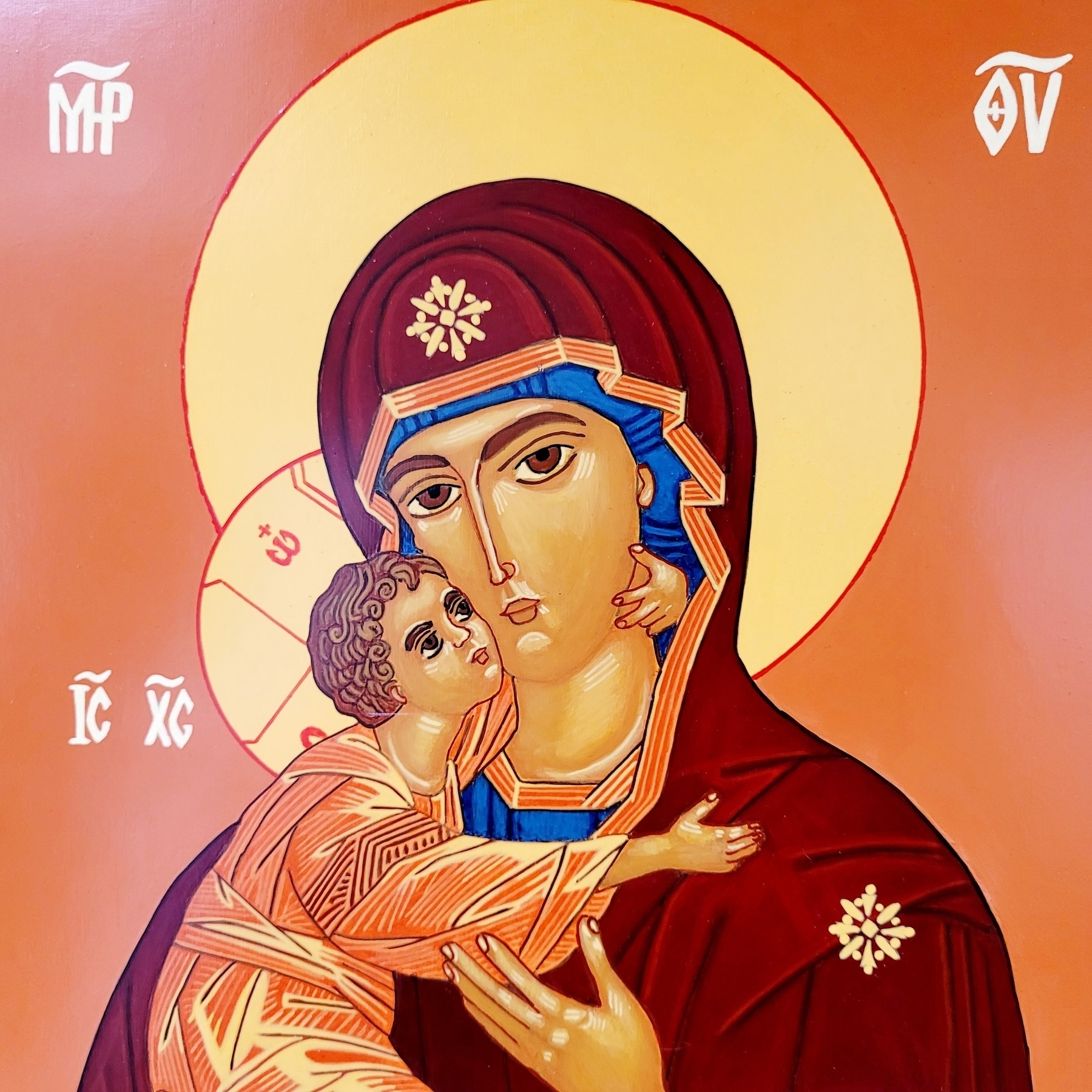
Photo: Icon written by Dennis Maloney
Today the Church celebrates James the Elder, Apostle.
O gracious God, your servant and apostle James was first among the Twelve to suffer martyrdom for the Name of Jesus Christ: Pour out upon the leaders of your Church that spirit of self-denying service, by which they may have true authority among your people; through Jesus Christ our Lord, who lives and reigns with you and the Holy Spirit, one God, now and for ever. Amen.
Art: Calling of Saint James and Saint John, James Tissot 1886-1894
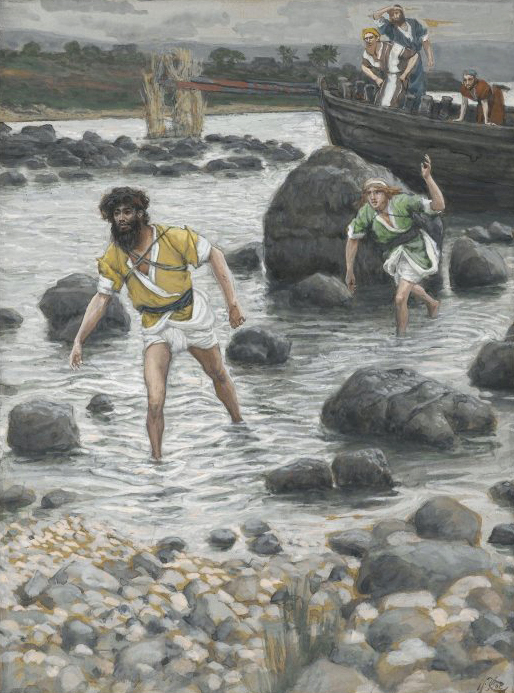
Today at St. George’s Anglican Church Pastor Shane reminded us that pride is the source of judgmentalism, and that ultimately, no one has any cause to compare themselves to others.
All pride in ourselves is ultimatley misplaced, because we all miss the mark when it comes to what’s most important: eternal life now and forever.
God pours out his mercy on all, and that’s all that matters.
 NRH
NRH